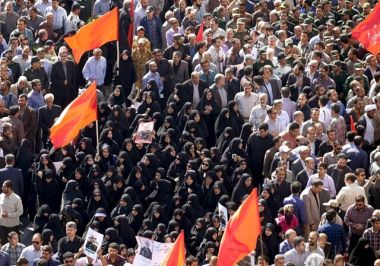Iran dealt 'psychological blow' by ISIS with killing of Iranian general — US intelligence

Iran's senior commander in Syria was killed during an Islamic State attack recently—a development deemed significant by the US intelligence community, saying this dealt "a psychological blow" to the elements supporting the regime of President Bashar al-Assad.
Brig. Gen. Hossein Hamedani was killed outside Aleppo, Syria, where he was reportedly advising the Syrian army in its fight against extremists, CNN said citing Iranian state media.
"He was in charge of [Iranian] operations inside Syria," said former CIA officer Reuel Marc Gerecht. "He's been involved in this from A to Z, so in the short term, it's probably a fairly significant loss."
"There's no doubt that it is a psychological blow to pro-regime forces in Syria,'' Gerecht added, noting fighters supporting the government will also be greatly affected by his loss.
A Washington-based analyst believes that the ISIS killing of a commander of the Iranian Revolutionary Guards served to underscore the extent of Iranian involvement in Syria and the dire straits in which Assad finds himself, according to CNN.
"The fact that you have a senior Iranian general shows both the desperation of the regime as well as the degree of Iranian involvement now in Syria," said Andrew Tabler of the Washington Institute for Near East Policy.
Last week, Iranian media reportedly carried messages of condolence from Iranian President Hassan Rouhani, who described Hamedani's death as a big loss and applauded the senior commander for his bravery.
The United States and Iran are both fighting ISIS, but they have different agendas: The United States is supporting rebels trying to oust Assad, while Iran is trying to defend Assad's regime, CNN said.
"I'm not sure it's the Iranian objective to beat ISIS," said Gerecht. "I think the primary Iranian objective is to ensure that Assad does not fall."
The US intelligence official said Washington is of the belief that Iran has been sending its top military advisers and weapons to Syria since 2012.
Assad publicly thanked Iran and Russia for their support during an interview with Iranian TV last weekend.
"We want help from our friends, and this is what Iran is offering, and what Russia is offering," he said, according to CNN. He also hailed Russia's recent initiative to form a coalition between Russia, Syria and Iran.
Tabler believes that Iran was instrumental in bringing Russia into a coalition to come to the regime's aid—and planning a two-tiered military comeback campaign to do it, according to CNN.
"While most attention seems to have been focused on Russian intervention in the last week or so in Syria," he continued, "actually it is combined with a giant Iranian offensive that was planned months ago with the Russians—and that is unfolding."











